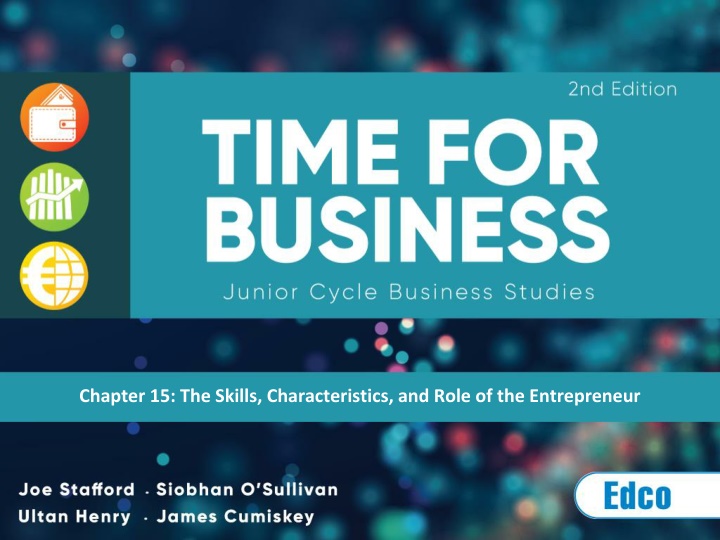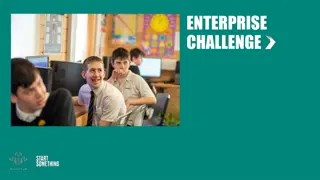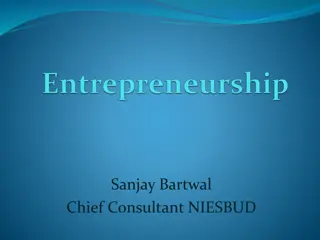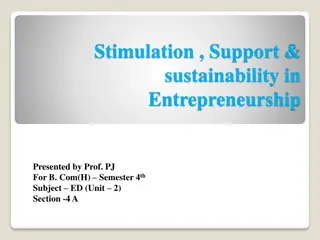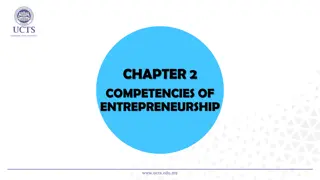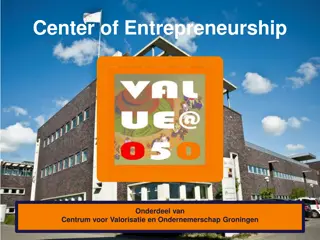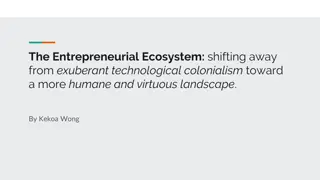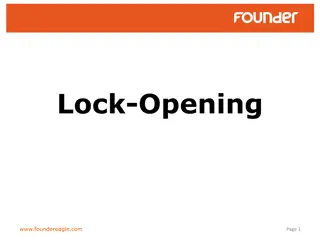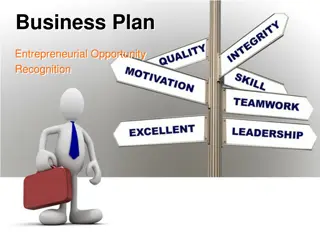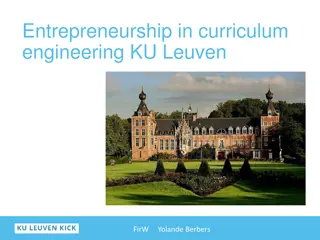Unlocking Entrepreneurial Skills and Characteristics
Explore the dynamic world of entrepreneurship in Chapter 15, focusing on the essential skills, characteristics, and role of an entrepreneur. Learn about the diverse categories of enterprise, the motivations behind starting a business, and how entrepreneurs contribute to society and the economy. Discover how entrepreneurs generate business ideas and the stages involved in developing innovative products or services.
Download Presentation

Please find below an Image/Link to download the presentation.
The content on the website is provided AS IS for your information and personal use only. It may not be sold, licensed, or shared on other websites without obtaining consent from the author.If you encounter any issues during the download, it is possible that the publisher has removed the file from their server.
You are allowed to download the files provided on this website for personal or commercial use, subject to the condition that they are used lawfully. All files are the property of their respective owners.
The content on the website is provided AS IS for your information and personal use only. It may not be sold, licensed, or shared on other websites without obtaining consent from the author.
E N D
Presentation Transcript
Chapter 15: The Skills, Characteristics, and Role of the Entrepreneur
Chapter 15 Learning intentions In this chapter you will learn to: Define the term enterprise Identify and illustrate enterprise in personal life, school, government and business Outline the characteristics and skills of entrepreneurs Profile an entrepreneur Appreciate the rewards and risks of being an entrepreneur Describe different categories of enterprise: financial, cultural and social Identify the reasons for starting a business Evaluate the role of an entrepreneur in an organisation Appreciate the role played by entrepreneurs in society and the economy Outline how entrepreneurs get ideas for businesses Identify and explain internal and external sources of new product or service ideas Explain the stages in the new product or service development process. Textbook page reference: 176
Chapter 15 What is enterprise? Enterprise is any attempt to start or do something new. Enterprise is about turning ideas into actions. It involves creativity and a willingness to try new things. Textbook page reference: 177
Chapter 15 Enterprise in the home/personal life Learning a new skill, such as playing a musical instrument or taking a part-time course to study computing or languages Carrying out some DIY to decorate or improve your house Starting to prepare household budgets to ensure you have enough money to pay your bills Selling unwanted household items, such as furniture, baby accessories and old games consoles, to make some extra cash. Textbook page reference: 177
Chapter 15 Enterprise in school Starting a student enterprise or mini company Students or teachers setting up a club/society Organising a school event or trip Introducing new subjects or a course like the Leaving Certificate Vocational Programme (LCVP) into the school. Textbook page reference: 177
Chapter 15 Enterprise in the community Local people setting up a sports club, youth club or scout troop A community establishing a Neighbourhood Watch scheme or Tidy Towns committee A group of people starting a Meals on Wheels service for the elderly. Textbook page reference: 177
Chapter 15 Enterprise in the public service In 2019 the government introduced the National Broadband Plan to supply broadband services to all parts of Ireland. Coillte was set up by the government to develop Irish forests. The Revenue Commissioners launched an online facility (ROS) to allow people to manage their tax affairs online. Local Enterprise Offices (LEOs) were set up to help Irish people set up their own businesses and create jobs in their local area. LEOs also run the Student Enterprise Programme to promote enterprise in Irish schools. Textbook page reference: 177
Chapter 15 Enterprise in business Business enterprise is a specific type of enterprise that provides a range of goods and services to consumers. Entrepreneurs start business enterprises. Textbook page reference: 177
Chapter 15 Enterprising People An entrepreneur is a person who takes the initiative as well as the personal and financial risk involved in setting up an organisation. Enterprise is not just about business. It can happen in many different areas of people s personal, working and social lives. Textbook page reference: 177 178
Chapter 15 Enterprising People Social entrepreneurs use their enterprising skills to develop organisations that benefit the wider community. Textbook page reference: 178
Chapter 15 Characteristics and skills of entrepreneurs No two entrepreneurs are exactly alike, but they often share similar characteristics and skills. A characteristic is a personality trait that you are born with. A skill is an ability or expertise that people develop through practice, experience, learning or training. Textbook page reference: 179 181
Chapter 15 Characteristics of entrepreneurs Realistic risk-takers Innovative Proactive Flexible Self-confident Decisive Determined/ resilient Textbook page reference: 179 180
Chapter 15 Characteristics of entrepreneurs Successful entrepreneurs are realistic risk-takers, which means they research carefully, weigh up the risks involved and take a chance only if they see a reasonable chance of success. Textbook page reference: 179
Chapter 15 Characteristics of entrepreneurs Being innovative means being able to do something in a new or different way. Textbook page reference: 180
Chapter 15 Characteristics of entrepreneurs Entrepreneurs are proactive, which means that they are prepared to make things happen, rather than waiting for someone else to act. Textbook page reference: 180
Chapter 15 Characteristics of entrepreneurs Entrepreneurs are flexible. They learn from their mistakes and failures by adapting when things don t go according to plan. Textbook page reference: 180
Chapter 15 Characteristics of entrepreneurs Entrepreneurs are self-confident, they believe in themselves and in their business idea. Textbook page reference: 180
Chapter 15 Characteristics of entrepreneurs Entrepreneurs are decisive, they have the ability to make timely decisions and take responsibility for the decisions they make. Textbook page reference: 180
Chapter 15 Characteristics of entrepreneurs Entrepreneurs are determined/resilient, they do not give up easily when faced with obstacles and failures. Textbook page reference: 180
Chapter 15 Skills of an entrepreneur Ability to identify opportunities Planning and goal setting Time Ability to manage money management Ability to assess and manage risk Human relations skills Textbook page reference: 181
Chapter 15 Skills of an entrepreneur Ability to identify opportunities: entrepreneurs have the ability to spot a need or gap in the market that is not currently being met and seize the opportunity. Textbook page reference: 181
Chapter 15 Skills of an entrepreneur Planning and goal setting: entrepreneurs learn to set strategic goals for themselves and their business using plans to achieve these goals. Textbook page reference: 181
Chapter 15 Skills of an entrepreneur Time management: entrepreneurs use their time carefully to achieve their goals. Textbook page reference: 181
Chapter 15 Skills of an entrepreneur Ability to manage money: entrepreneurs need to have good financial skills in order to prepare budgets and manage cash flow. Textbook page reference: 181
Chapter 15 Skills of an entrepreneur Human relations skills: entrepreneurs use good communication and listening skills to get on with people. Textbook page reference: 181
Chapter 15 Skills of an entrepreneur Ability to assess and manage risk: entrepreneurs measure the risks involved in a potential course of action and take steps to minimise these risks. Textbook page reference: 181
Chapter 15 Enterprise and employees An enterprising employee within an existing business is called an intrapreneur. Textbook page reference: 183
Chapter 15 Rewards of being an entrepreneur Self-employed entrepreneurs who set up their own business may enjoy the following rewards: They are their own boss and get to make all the decisions in the business. They can choose to keep all the profit the business makes. They can work flexible hours or have flexible opening hours to suit the needs of their customers. They have a great sense of satisfaction if the business is a success. Textbook page reference: 184
Chapter 15 Risks of starting your own business You may lose the money you invested in the business if it fails. You will need to work long hours to get the business up and running and to oversee all aspects of the business. You may find it difficult to take time away from running the business. Sales may vary each week, so income is not guaranteed. You may not have all the necessary skills to set up and run a business. Your personal reputation and credit rating may suffer if the business fails. Textbook page reference: 184
Chapter 15 The role of the entrepreneur in an organisation Generates ideas Takes risks Provides leadership and management Provides vision and motivation Creates long- term plans Raises finance Textbook page reference: 185
Chapter 15 Role of entrepreneurs in the economy Make use of resources Provide goods and services Create jobs and wealth Provide training and develop skills Raise standards of living Generate tax revenue for government Boosts foreign trade via exports. Textbook page reference: 185 186
Chapter 15 Role of entrepreneurs in society Provide services Develop infrastructure and amenities Increase standard of living Help create an enterprise culture Sponsorship of community organisations. Textbook page reference: 186
Chapter 15 Sources of ideas for entrepreneurs Brainstorming is a way of working together as a group to generate ideas. Textbook page reference: 187
Chapter 15 Sources of new product ideas for existing businesses Internal sources Brainstorming sessions Feedback from sales personnel Ideas from employees in the business (intrapreneurship) The research and development (R&D) department. Textbook page reference: 188
Chapter 15 Sources of new product ideas for existing businesses External sources Competitors Import substitution Customer complaints or feedback Market research Import substitution involves replacing goods bought from abroad (imports) with goods produced in Ireland. Textbook page reference: 189
Chapter 15 Sources of new product ideas for existing businesses Market research is gathering, recording and analysing information about consumer preferences for a good or service in order to make informed decisions about a potential market. Textbook page reference: 190
Chapter 15 The product development process 1. Idea generation 2. Product screening 3. Concept development 4. Feasibility study 5. Prototype development 6. Test marketing 7. Product launch Textbook page reference: 191
Chapter 15 Recap and review Can you: Define the term enterprise ? Identify and illustrate enterprise in personal life, school, government and business? Outline the characteristics and skills of entrepreneurs? Profile an entrepreneur? Appreciate the rewards and risks of being an entrepreneur? Describe different categories of enterprise: financial, cultural and social? Identify the reasons for starting a business? Evaluate the role of an entrepreneur in an organisation? Appreciate the role played by entrepreneurs in society and the economy? Outline how entrepreneurs get ideas for businesses? Identify and explain internal and external sources of new product or service ideas? Explain the stages in the new product or service development process?
Chapter 15 Credit slide Shutterstock
